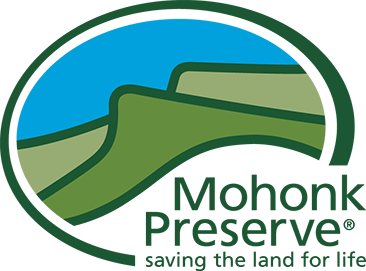- Peregrine falcons are listed by the State of New York as an Endangered Species and are legally entitled to protection from human disturbance during the breeding season. As a conservation organization, Mohonk Preserve takes this responsibility seriously as part of our mission, and we have been helping support peregrine falcon nesting success on the Shawangunk Ridge for many decades.
- After extensive research into peregrine falcon conservation efforts nationwide, the Preserve has adopted a responsive management approach to our cliff closure, with a broader closure at the beginning of the breeding season to optimize successful nest site selection.
- Once a nest is established, which typically occurs in early March, we reduce the size of the closure, using a line-of-sight approach to establish the extent of restrictions for both climbing and bouldering.
- Peregrine falcons are most sensitive to disturbance of all kinds during the early season period before a nest is established and eggs are laid. Peregrine falcons are sensitive to visual disturbances and may also respond to noise threats, particularly if the noise is loud or unpredictable.
- Peregrine falcons that nest in natural areas are less tolerant of humans than peregrines that nest in urban areas and are prone to aggressively attack people that they perceive as intruding on their territories.
- When nesting peregrine falcons respond to a disturbance, they risk direct injury and leave their nest, eggs and/or young vulnerable to predators, scavengers and inclement weather.
- Peregrine falcons will aggressively defend a nest against a perceived intruder. This can be extremely dangerous for humans. Humans who get close to peregrine nests risk significant injury, especially to the head and face.
- Mohonk Preserve has an experienced and dedicated group of community science volunteers and staff who monitor the nest sites almost daily to track the activity of the birds and the status of the breeding season.
- The peregrine breeding season may possibly run through late summer.
- Due to the peregrine’s endangered status, the Preserve doesn’t disclose information about nest locations or outcomes, but regardless of the outcomes, we are obligated to protect all nests on Preserve property.
- Even during the broader early season closure, over 60 percent of the documented boulder problems and climbing routes in the Trapps and Near Trapps remain open and available.
- Peregrine-related access restrictions are only one of various types of access restrictions that the Preserve puts in place as needed for safety, conservation and to protect infrastructure. These restrictions affect equestrians, cyclists, hikers, hunters, rock climbers, boulderers, and, in some cases, all Preserve users.
- The Preserve has worked collaboratively with the climbing community for decades to help protect the peregrine falcons and appreciate their support of our conservation mission.
